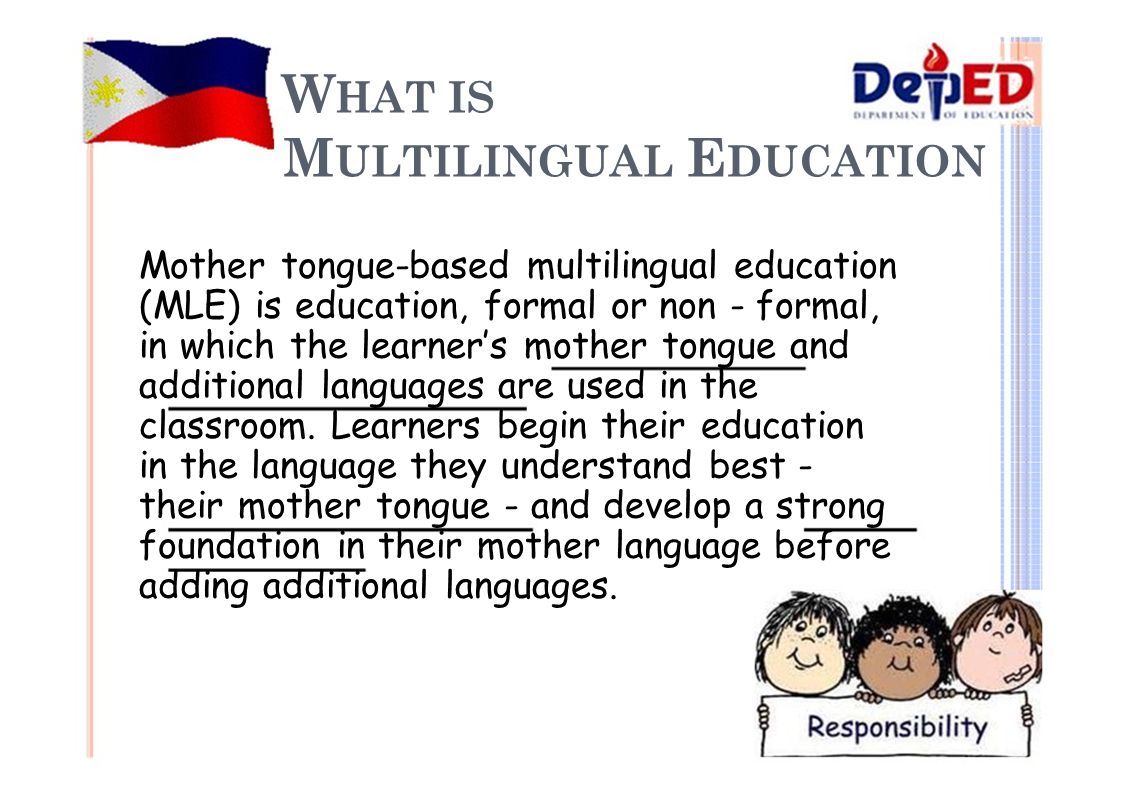The conference brought together over 300 practitioners from 30 countries, reflecting the incredible diversity of the Asia-Pacific region and clearly demonstrating the importance of Mother Tongue-Based Multilingual Education (MTB-MLE). This brochure summarises some of the key messages from this landmark event. What role can language. Mother Tongue-Based Multilingual Education: UNESCO Asia-Pacific In Graphic Detail #1 23 Oct 2018 Children learn better in their mother tongue first, but 40% worldwide never have that chance.
Mother Tongue Based Multilingual Education Articles
To: Undersecretaries
Assistant Secretaries
Bureau Directors
Directors of Services, Centers and Heads of Units
Regional Directors
Schools Division/City Superintendents
Heads, Public and Private Elementary and Secondary Schools
- The lessons and findings of various local initiatives and international studies in basic education have validated the superiority of the use of the learner’s mother tongue or first language in improving learning outcomes and promoting Education for All (EFA).
- Mother Tongue-Based Multilingual Education, hereinafter referred to as MLE, is the effective use of more than two languages for literacy and instruction. Henceforth, it shall be institutionalized as a fundamental educational policy and program in this Department in the whole stretch of formal education including pre-school and in the Alternative Learning System (ALS).
- The preponderance of local and international research consistent with the Basic Education Sector Reform Agenda (BESRA) recommendations affirms the benefits and relevance of MLE. Notable empirical studies like the Lingua Franca Project and Lubuagan First Language Component show that:
- First, learners learn to read more quickly when in their first language (LI);
- Second, pupils who have learned to read and write in their first language learn to speak, read, and write in a second language (L2) and third language (L3) more quickly than those who are taught in a second or third language first; and
- Third, in terms of cognitive development and its effects in other academic areas, pupils taught to read and write in their first language acquire such competencies more quickly.
- Relatedly, the study of the Department of Education Region IV-B (MIMAROPA) entitled “Double Exposure in Mathematics: a Glimpse of Mother Tongue First” has provided the local validation of the fundamental observation that top performing countries in the Trends in International Mathematics and Science Study (TIMSS) are those that teach and test students in science and math in their own languages.
- All Regional Directors and Superintendents are hereby enjoined to promote and encourage local participation in the following essential, support systems of the MLE within the framework of School-Based Management (SBM) with the support of the local government units:
- Formulation of region-specific schemes to recognize and institutionalize the initiatives of schools and localities through appropriate incentives or policy support in bringing about and developing MLE towards financial and instructional self-reliance and excellence;
- Provisions of orientation and training opportunities along with exposure to successful models of MLE that have been developed. The gradual integration of MLE in all subject areas and at all grade levels (beginning in preschool and continuing by adding a grade level per year) in the school improvement plans (SIPs) and district ALS program is likewise enjoined effective immediately;
- The utilization of Maintenance and Other Operating Expenses (MOOE), school board funds, and other education improvement funds is hereby authorized for the planning and implementation of MLE programs in the following sequence of priority: (1) advocacy work and community mobilization; (2) development of a working orthography of the local language; (3) MLE orientation and teachers training; (4) developing, printing and distributing teachers’/facilitators’ guides; (5) reading materials and other instructional materials; (6) development of assessment tools; and (7) evaluation and monitoring of learning outcomes; and
- An MLE technical working group at the regional and division levels shall be established to facilitate MLE planning, monitoring and evaluation.
- During the first three years of implementation, the enclosed “MLE Bridging Plan” may be used for reference for both teaching and curriculum development. For the ensuing years, adjustments may be made based on monitoring and evaluation results.
- For all learning programs of the Alternative Learning System (ALS), the learners’ first language shall be used as primary medium and thereafter, depending upon the previous level of functional literacy and pedagogical requirements of accreditation and equivalency, the Bureau of Alternative Learning System (BALS) shall determine the suitable second and third languages that will maximize the educational benefits and competencies of the ALS clients. Enclosed is the Fundamental Requirements for a Strong Mother Tongue-Based Multilingual Education (MLE).
- This Department with the help of MLE specialists shall incorporate an MLE certification process and retain the privilege of establishing MLE certification procedures in order to maintain quality MLE programs wherever they may be implemented.
- All orders, memoranda, issuances, rules and regulations or parts thereof inconsistent with the provisions of this Order are hereby rescinded, amended, or modified accordingly.
- Immediate dissemination of and compliance with this Order is directed.
Mother Tongue-based Multilingual Education Thesis Statement
Encl.:
As stated
Reference:
None
Allotment: 1—(D.O. 50-97)
Mother Tongue Based Multilingual Education Tagalog
To be indicated in the Perpetual Index under the following subjects:
CURRICULUM
LANGUAGE
POLICY
RULES & REGULATIONS




